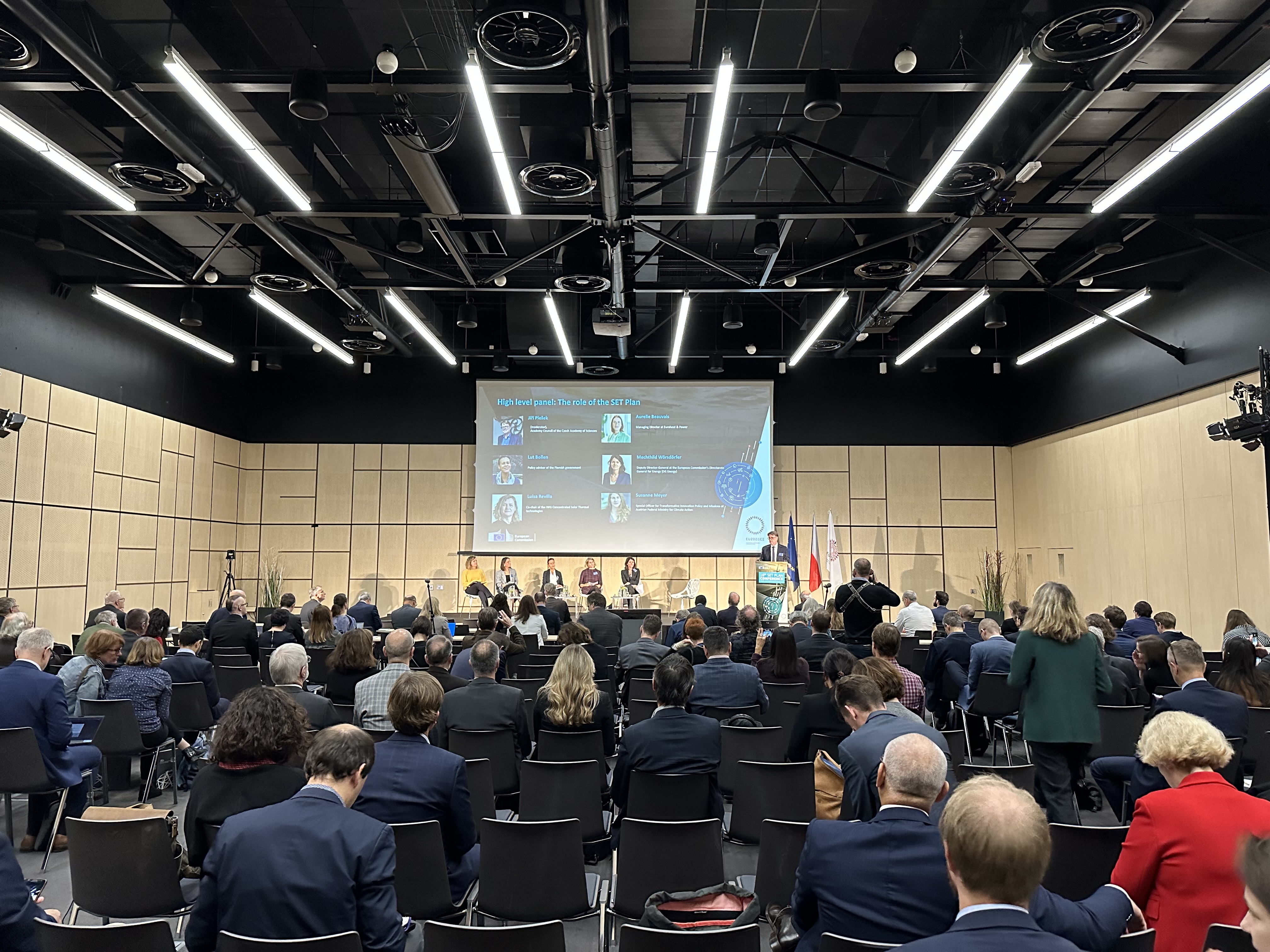The ETIP SNET attended the 16th SET Plan conference, “Towards a new Strategic Energy Technology Plan” within the framework of the ETIPs FORUM

date: 22/12/2022
Since its promulgation 15 years ago, the SET Plan has established the overall framework for promoting strengthened cooperation in R&I between the EU, Member States and its research and industry sectors to step up the efforts to bring new, efficient and cost-competitive low-carbon technologies faster to the market and deliver the energy transition in a cost-competitive way.
Over the last year, the European Commission (EC) has gathered opinions and ideas from the entire SET Plan Community to review the objectives, governance, scope, and activities of the Plan. These findings fed into the 16th SET Plan conference, “Towards a new Strategic Energy Technology Plan”, hosted in Prague under the auspices of the Czech Presidency of the Council of the EU on 9th and 10th November. The conference explored the transformational pathways to sustainable, secure, resilient and competitive energy systems and value chains. It also raised awareness among all its stakeholders on the latest R&I in the field of carbon-neutral energy technologies.
The ETIPs FORUM was created in June 2021 – under initiative of the ETIP SNET - to develop a stable and structured dialogue among the 10 ETIPs and assimilated entities to avoid duplications and to share the know-how and expertise of the numerous experts involved in all the ETIPs towards the same decarbonisation goal and mission by 2030 and 2050. The ETIPs FORUM will reconvene during the Q1 of 2023 to further contribute to the SET Plan renewal where needed.
Ahead of the SET Plan's revision, the ETIPs FORUM – with the support of EERA - compiled 8 recommendations to inform the EC and other stakeholders involved in the process about the ETIPs' common position regarding the SET Plan implementation and recommend possible pathways for a more efficient and inclusive execution of the planned actions. These recommendations have been submitted to the public consultation the EC opened concerning the SET Plan revision and were brought to the SET Plan Conference. Moreover, these recommendations have been complemented by a position paper providing specific feedback as a result of a dedicated survey, to which the ETIPs and assimilated organisations replied to.
Below is the list of the 8 recommendations:
- SET Plan IWGs’ Implementation Plans (IPs) and the respective ETIPs’ Work programmes (in the form of SRIAs/Roadmaps/Implementation Plans etc…) should be aligned in overarching goals and objectives. They should pursue mission-oriented approaches to reach impacts and to be adopted by all involved actors (EC, Members States, industries, research communities). The SET Plan's overall goals and objectives as a European framework should be reaffirmed and informed by the contributions received from IWGs and ETIPs' Plans on a selected number of areas.
- The revised SET Plan should be in line with the European Green Deal and future high-level energy policy developments. It should be sufficiently flexible to integrate major changes, and its main provisions should be adequately integrated into the National Energy Climate Plans (NECPs) and other relevant national policies and/or strategies. The SET Plan should also support in a strong and active manner the achievement of the aforementioned policy goals - hence, not limiting its role only to the alignment of different policy priorities.
- The ETIPs FORUM recognises the need to enhance discussion, interaction and collaboration between the decision/policy makers, ETIPs (including European industries, researches centres, academia, and NGOs) and EERA with the precise and concrete goal of facilitating and fostering the alignment of priorities between SET Plan IWGs’ IPs, national R&I agendas and ETIPs. It is crucial to foresee a fruitful and structured discussion about the incoming legislative proposals with the activities to be developed at the R&D level.
- The revised SET Plan must have a clear governance structure, transparent processes, and a process for utilizing and implementing the SET Plan in the Member States and relevant markets. Moreover, it must be open to accommodate new and relevant stakeholders (even as official observers or advisory groups for specific thematic areas), while the role of those already part of it must be clarified. All the already existing and new proposed roles in the SET Plan's Governance must be clearly defined in the revised structure. A clear and well-structured definition of the roles and responsibilities of each involved actor (EC, MSs, ETIPs, IWG components, NRCGs and NSCGs) must be provided in a more public, transparent, and integrated way.
- The revised SET Plan governance should allow a structured and efficient collaboration and exchange with the ETIPs. These interactions should take place at the level of the SET Plan Steering Group. To this respect, the regular involvement of the ETIPs and EERA as an observer in the SET Plan Steering Group is highly suggested and supported.
- It is necessary to enhance the existing dialogue and exchange between the ETIPs and the EC DGs in charge of the SET Plan - thus, specifically, DG ENER, DG RTD, and JRC). This communication and exchange need to be intended at two different levels: a) yearly involvement in the SET Plan Conference: oo-organisation of specific thematic sessions and a dedicated space for the dissemination of the main outputs; b) A constant and recognised role in the SET Plan Steering Group as specified in Recommendation n.5.
- The SET Plan should provide conditions for collaboration on cross-cutting activities – both technological and non – between the different IWGs and ETIPs, while respecting their distinctive sector-specific missions and works. Relevant cross-cutting topics may include digitalisation, skills, sustainability/circularity, acceptability of renewables/citizens’ empowerment. This action would certainly boost energy system integration and help to address common challenges, align work plans and enhance synergies across industries, research centres, academia and other organisations.
- ETIPs’ experts should contribute to enriching the technical expertise of the SET Plan IWGs to improve their capacity to translate technology-specific challenges into specific innovation and R&I objectives.
